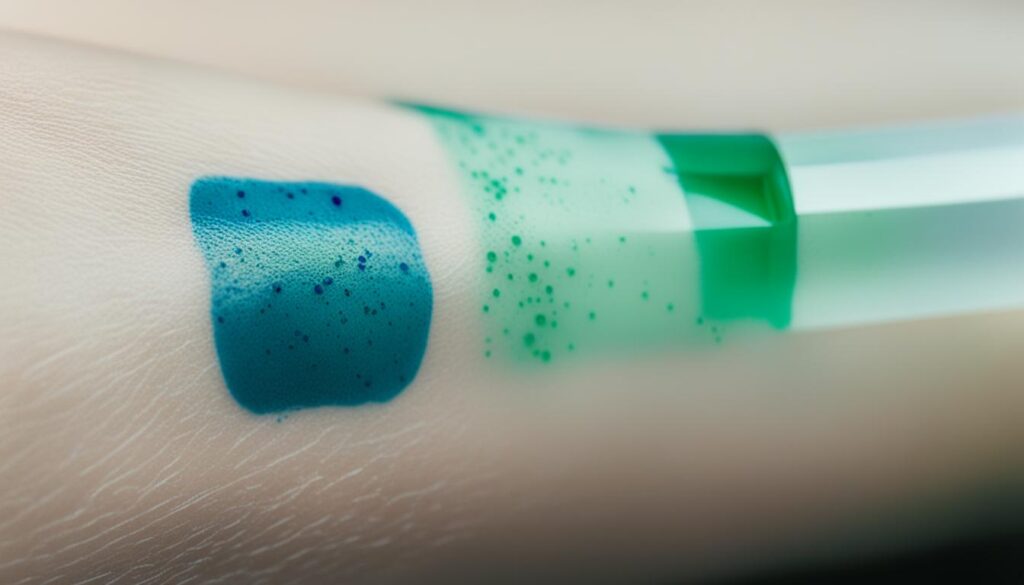Can you get a tattoo while on blood thinners? Many individuals on blood thinners wonder if it is safe to get a tattoo. While it is not impossible, there are certain risks and precautions to consider. Blood thinners can affect the tattooing process, increase the risk of bleeding, impact the healing process, and potentially lead to infections. It is important to consult with a doctor and the tattoo artist to assess the feasibility and safety of getting a tattoo while on blood thinners. Let’s explore the details.
Key Takeaways:
- Getting a tattoo while on blood thinners can pose risks and complications.
- Blood thinners can increase bleeding during the tattooing process.
- Excessive blood loss during tattooing can have dangerous side effects.
- Blood thinners may affect the visibility and outcome of the tattoo.
- Delayed healing and increased infection risk are concerns with blood thinners.
How Blood Thinners Affect the Tattoo Process
When taking blood thinners before getting a tattoo, the blood thinning effects can significantly impact the tattooing process. One of the primary concerns when getting a tattoo on blood thinners is the increased risk of bleeding during the procedure. Blood thinners make it easier for the blood to seep through the freshly opened areas created by the needles, resulting in higher volumes of bleeding.
The excess bleeding caused by blood thinners can pose various challenges during the tattooing process. First and foremost, it can impede the visibility of the tattoo artist. Excessive bleeding can make it difficult for the artist to accurately see the design, resulting in potential mistakes or less precise work.
Moreover, prolonged bleeding caused by blood thinners can also affect the clotting process. Clotting is an essential part of the healing process, as it aids in sealing the tattooed area and preventing excessive blood loss. However, blood thinners can hinder the natural clotting process, leading to prolonged bleeding and potentially delaying the healing time of the tattoo.
Risks Associated with Blood Loss during Tattooing
Getting a tattoo involves puncturing the skin with needles, which can result in blood loss. However, for individuals on blood thinners, the risks of bleeding during the tattooing process can be significantly heightened.
The potential large amount of blood loss during a tattooing session can lead to dangerous side effects. Losing too much blood can cause weakness and dizziness. Additionally, excessive blood loss can potentially result in serious complications.
It is crucial for individuals considering a tattoo while on blood thinners to understand and consider the risks of blood loss. Consultation with a doctor before proceeding with the tattoo is highly recommended. The doctor can evaluate the individual’s overall health condition and determine if getting tattooed while on blood thinners is safe.
By educating themselves about the dangers of bleeding when on blood thinners, individuals can make informed decisions about their tattooing journey and minimize potential risks.
| Risks of Blood Loss during Tattooing | Dangers of Bleeding when on Blood Thinners |
|---|---|
| Increased risk of complications | Weakness and dizziness |
| Excessive blood loss | Potential serious health complications |
| Delayed tattoo healing | Increased risk of infection |
Impact on Tattoo Visibility and Outcome

Taking blood thinners can have an impact on the visibility and outcome of a tattoo due to the increased bleeding it can cause. The excess blood from the tattooed area can hinder the tattoo artist’s ability to clearly see the design and work on it effectively.
When blood thinners are present, the increased bleeding can make it difficult for the artist to distinguish between the ink and the blood. This can affect their precision and accuracy in creating the desired tattoo, potentially leading to a less crisp and defined appearance.
The visibility of fine details and intricate lines can also be compromised due to the excess blood flow. This can result in a less intricate and detailed tattoo.
It is crucial to have a discussion with the tattoo artist before getting inked while on blood thinners. Open communication will allow the artist to assess the suitability of working with increased bleeding and ensure they can adapt their techniques to achieve the best possible outcome.
Additionally, it is important for individuals considering a tattoo while on blood thinners to have realistic expectations. The presence of blood thinners may increase the risk of ink spreading and fading over time. This can affect the long-term appearance of the tattoo.
Delayed Healing and Increased Infection Risk
Blood thinners can have a significant impact on the healing process of a tattoo. These medications impede the clotting process, which can result in prolonged healing time compared to individuals not taking blood thinners. The delayed healing leaves the tattooed skin vulnerable to bacterial contamination for an extended period, increasing the risk of infection.
To minimize the risk of infection, it is crucial to take extra precautions and follow proper aftercare instructions. These measures may include keeping the tattooed area clean, avoiding exposure to dirty environments, and using recommended creams or ointments. It is essential to consult with your tattoo artist or a healthcare professional to discuss specific aftercare guidelines tailored to your situation.
The Importance of Proper Aftercare
During the healing process, maintaining good hygiene is essential to prevent infections. It is recommended to gently wash the tattooed area with mild soap and warm water, pat it dry with a clean towel, and apply a thin layer of an appropriate aftercare product like tattoo-specific ointment or fragrance-free moisturizer. Avoid scratching, picking scabs, or exposing the tattoo to excessive moisture, sunlight, or chemicals.
Moreover, individuals taking blood thinners should be aware that the healing process may take longer compared to those not on these medications. It is crucial to be patient and attentive to any signs of infection, such as excessive redness, swelling, oozing, or intense pain. If any concerning symptoms arise, it is advisable to seek prompt medical attention to prevent complications.
Potential Financial Implications
Getting a tattoo while on blood thinners can have potential financial implications. The effects of blood thinners can lead to longer tattoo sessions, which may result in higher costs.
When tattooing on blood thinners, the frequent need for wipe-offs, dilution of inks, and management of excessive bleeding can extend the time and effort required by the tattoo artist. As a result, the overall cost of the tattoo session may increase.
Additionally, it is important to note that some tattoo artists may have reservations about tattooing individuals on blood thinners. They may refuse to perform the procedure due to the associated risks and potential complications. This refusal could lead to rescheduling and additional costs for finding another tattoo artist or seeking medical clearance.
Therefore, when considering getting a tattoo while on blood thinners, it is crucial to take into account the potential financial implications. Consultation with both a doctor and a tattoo artist can provide a better understanding of the expected costs and any potential additional expenses that may arise.
Factors Affecting the Cost of Tattooing on Blood Thinners
| Factors | Impact on Cost |
|---|---|
| Duration of the tattoo session | Increase, as longer sessions are often required |
| Amount of blood loss | May require additional supplies and resources to manage excessive bleeding |
| Tattoo artist’s expertise | Highly skilled artists may charge more for managing the challenges posed by blood thinners |
| Tattoo artist’s policies | Some artists may charge a premium or refuse to tattoo individuals on blood thinners |
As seen in the table above, several factors can impact the cost of tattooing on blood thinners. These factors include the duration of the tattoo session, the amount of blood loss requiring additional resources, the expertise of the tattoo artist, and the individual artist’s policies regarding tattooing individuals on blood thinners.
Tattooing Restrictions and Medical Considerations
When considering getting a tattoo while on blood thinners, it is important to be aware of the restrictions and medical considerations that may arise. Many tattoo shops and artists have strict regulations in place for individuals with underlying medical conditions or taking certain medications, including blood thinners.
Before scheduling a tattoo appointment, you may need to disclose your medical information to the tattoo artist. Some artists may require a doctor’s note to ensure that getting a tattoo will not pose any health risks. This step is crucial in determining whether it is safe for you to proceed with the tattooing process.
By providing your medical information, you allow the tattoo artist to assess the feasibility and safety of tattooing while on blood thinners. They can evaluate whether there are any specific precautions or adjustments that need to be made to accommodate your condition.
It is important to understand that these restrictions and medical considerations are in place to prioritize your safety and well-being. Tattooing involves breaking the skin, which can introduce risks and potential complications when certain medical conditions or medications are involved.
By working closely with a tattoo artist who understands the medical implications of blood thinners and having an open and honest conversation about your health, you can make an informed decision about proceeding with a tattoo while on blood thinners.
Conclusion
After considering the risks and implications, it is important to approach the decision of getting a tattoo while on blood thinners with caution. The use of blood thinners can increase the risk of bleeding during the tattooing process and prolong the healing time, which may lead to a higher risk of infection. These factors should not be taken lightly.
Consulting with both a doctor and a tattoo artist is essential in order to assess the feasibility and safety of getting a tattoo while on blood thinners. They will be able to provide professional recommendations based on individual health circumstances. It is crucial to disclose all relevant medical information to the tattoo artist, and follow any restrictions or requirements they may have.
In the end, the decision to get a tattoo while on blood thinners should be made thoughtfully, taking into account the potential risks and the guidance of medical professionals. By prioritizing safety and making informed choices, individuals can minimize any potential complications and ensure the best possible outcome for their tattoo.
FAQ
Can you get a tattoo while on blood thinners?
How do blood thinners affect the tattoo process?
What are the risks associated with blood loss during tattooing?
How does being on blood thinners affect the visibility and outcome of a tattoo?
Does being on blood thinners prolong the healing time of a tattoo and increase the risk of infections?
Are there potential financial implications of getting a tattoo while on blood thinners?
Are there any restrictions or medical considerations for getting a tattoo while on blood thinners?
Should you get a tattoo while on blood thinners?
Forhad
Forhad's writing is not just about the artistry of tattoos or the latest trends in the industry; it's an exploration of the deep-rooted connections people have with their tattoos, reflecting personal narratives, cultural histories, and moments of transformation. Through a mix of in-depth features, personal narratives, and insightful analyses, he sheds light on the multifaceted nature of tattooing, revealing the emotional and cultural layers that lie beneath the surface.











